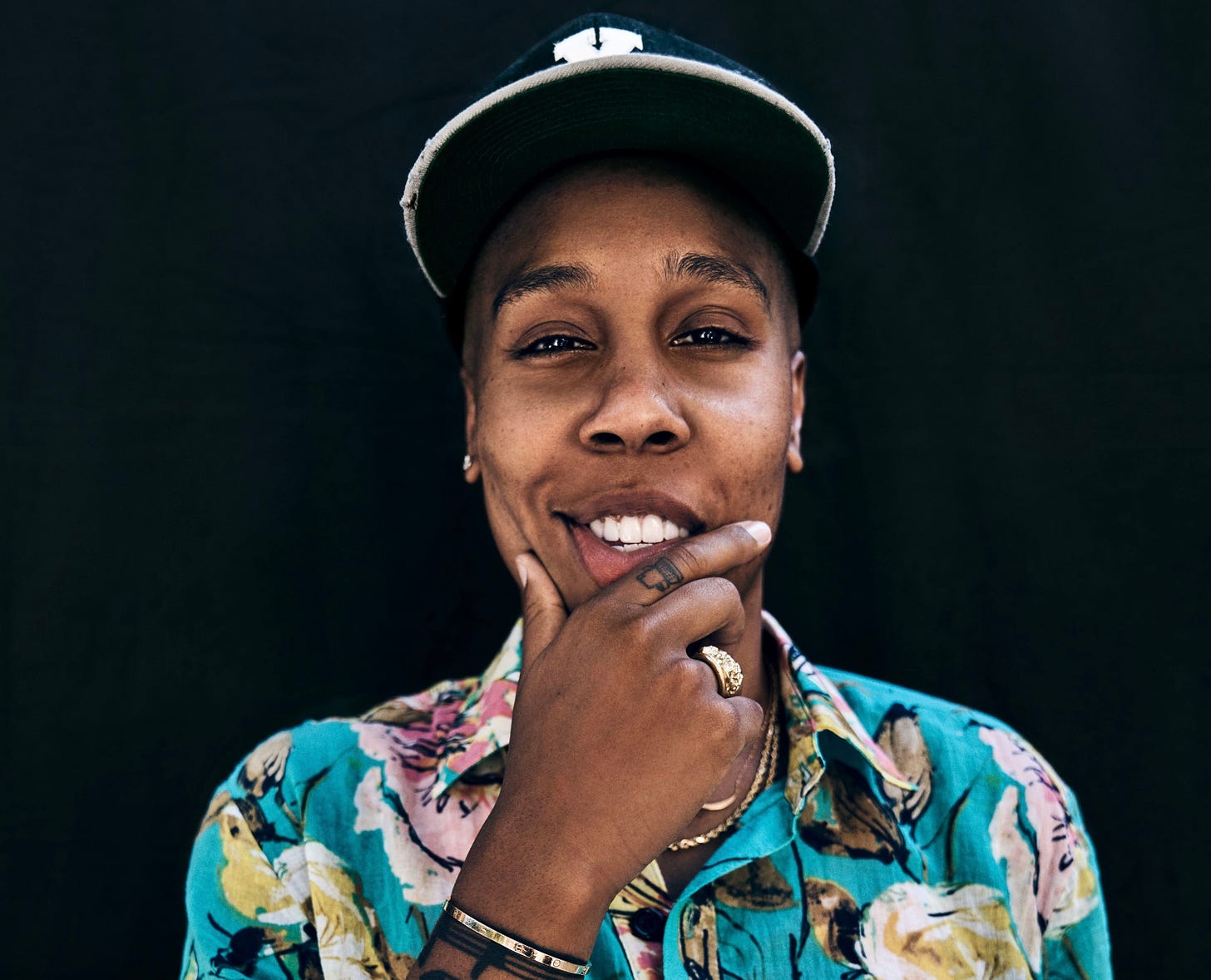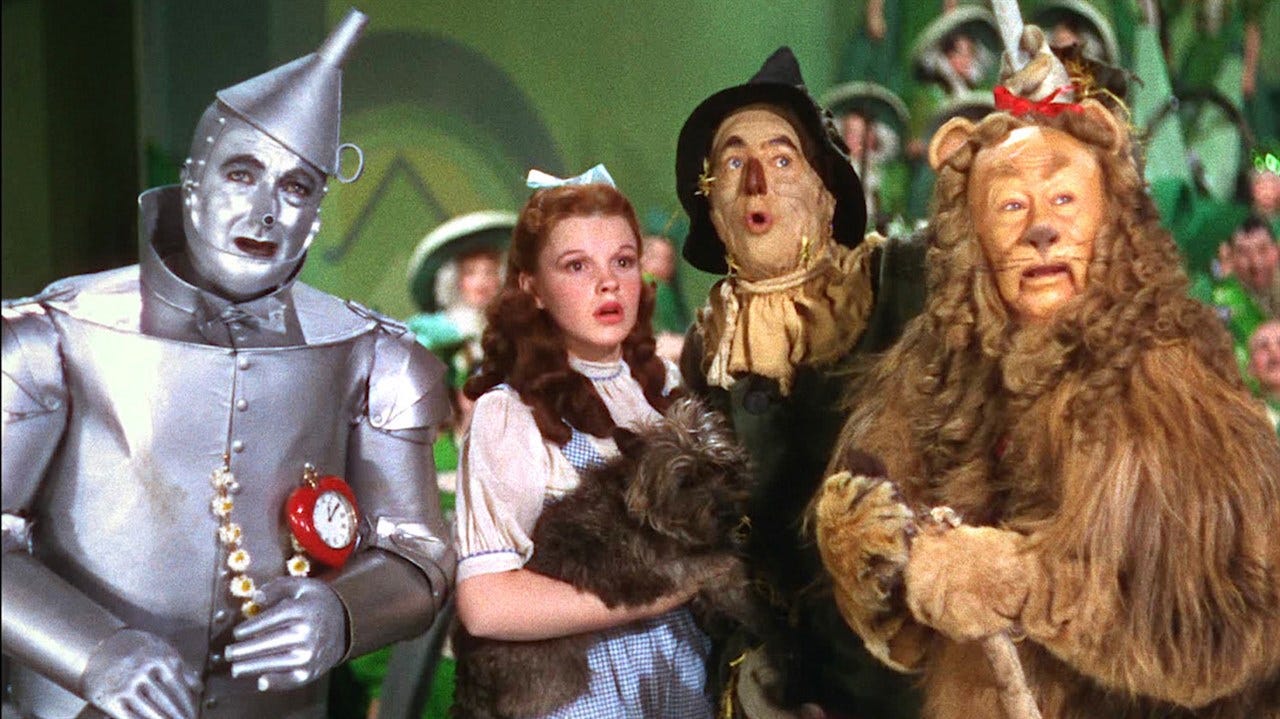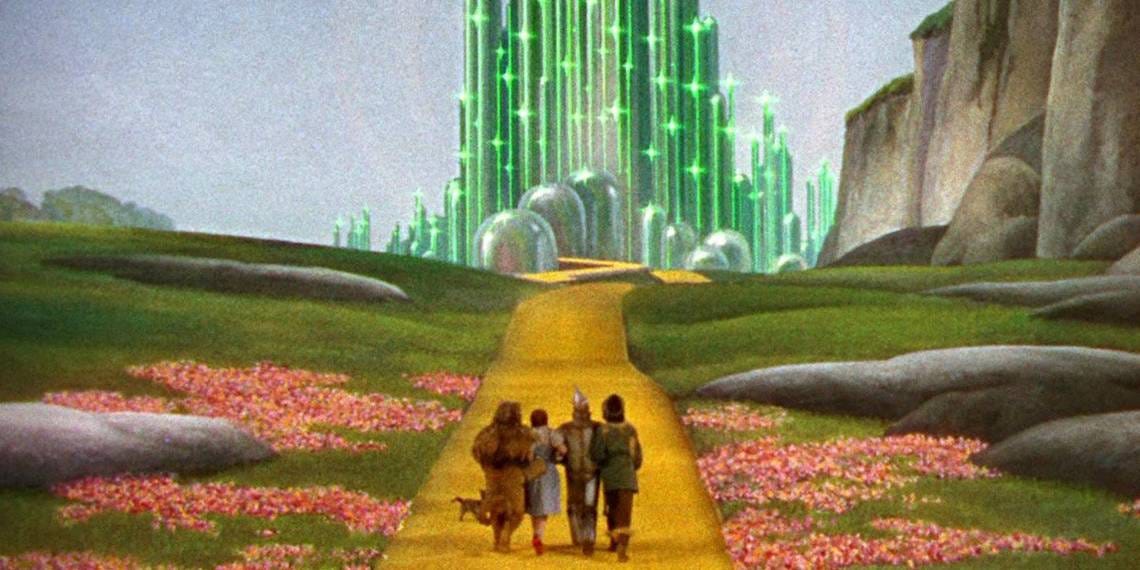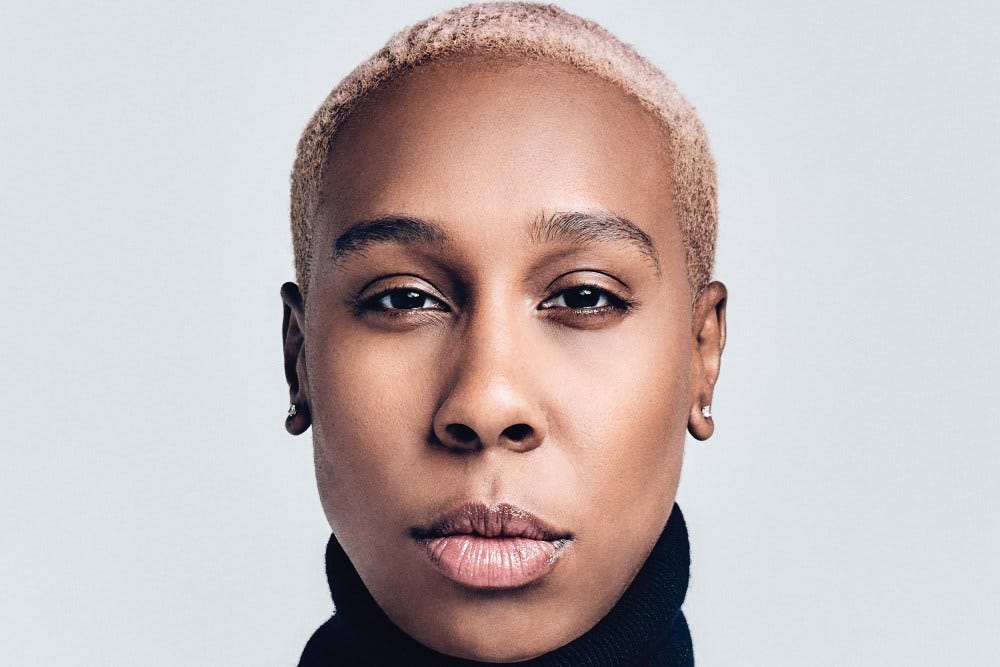Q&A: Filmmaker Lena Waithe Has Made It to the Emerald City
The screenwriter, actor, and producer discusses her creative journey from Chicago to Hollywood and back to where it started with 'The Chi' - all through the lens of 'The Wizard of Oz'
Today, Lena Waithe and I are going to discuss what The Wizard of Oz has meant to her through the years and explore how Dorothy’s story informs her own journey to the Emerald City - er, I mean Hollywood. In doing so, we’re also going to reveal how, like Dorothy, she found her way back to where she came from.
Maybe I should tell you how I know Lena first. The one and only time we met in the flesh was at a meeting of the Writers Guild of America’s Committee of Black Writers. I was running for the Board of Directors at the time on a diversity platform, and I’d made her and the various diversity committee chairs certain promises I was determined to keep - including showing up to meetings like these. When I introduced myself to Lena — who was not Lena Waithe the Emmy-winning writer yet — she immediately grabbed me and yanked me into a tight hug. It was one of the most welcoming hugs I’ve ever received in Hollywood, in fact, and I’ve never forgotten it.
Not long afterward, Lena won her first Emmy for co-writing “Thanksgiving” with Aziz Ansari, one of the most memorable episodes of “Master of None” - which is saying a lot because the series was a phenomenal achievement. It was inspired by her own experiences coming out to her mother. This was followed by a role as an actor in Steven Spielberg’s Ready Player One (2018), which was the point at which I realized Lena was going to be huge. A mystique of unmitigated coolness was already beginning to form around her. Some people are like that, I find. They just operate at some other wavelength from the rest of normal human beings. That’s Lena Waithe.
In the years since, Lena has written two feature films, Queen & Slim (2019) and Beauty (2022), created an impressive three television series — “The Chi” (now in its sixth season), “Boomerang”, and “Twenties” — as well as co-written and starred in a new edition of “Master of None” entitled “Master of None Presents: Moments in Love”. None of what I’ve listed here includes her impressive work as a producer — she has done spectacular work elevating marginalized voices — or her Best Play Tony nomination for Ain’t No Mo’.
Honestly, I have no idea when Lena sleeps. This is one of the reasons why I was confident she’d pass when I emailed and proposed she join me for one of my artist-on-artist conversations. Except she didn’t - which is what brings us here today.
What you’re about to read is an epic dive into Lena’s origins, craft, and creative journey through her more than two decades in Hollywood - which she compares to reaching the Emerald City. There’s so much for screenwriters and artists at any stage of their careers to learn from, but I would encourage you to especially focus on our expansive discussion of the “Thanksgiving” episode and “The Chi”. In the former, it’s a unique lesson in personal reconciliation through autobiographical art. In the latter, it’s a broader study of how to try to change your community through your art - an ambition Lena clearly possesses because of the impact Black art had on her as a child.
CH: Chicago’s South Side in the Eighties couldn’t have had less in common with rural Kansas in the early twentieth century, at least not that I can imagine. How did The Wizard of Oz enter your life, and can you remember what it felt like landing in such a beautiful Technicolor dream?
LW: I believe it was through my aunt – my maternal aunt, Diane – whom I’m named after. She was a big movie buff. She would take me to the movies a lot. And she loved old black-and-white movies, which I didn’t particularly love because I was a young kid, like under the age of ten, and those movies aren’t really paced for that age. But I remember her showing me The Wizard of Oz on VHS, and I was captivated by it. I was blown away by Judy Garland, by the song, “Somewhere Over the Rainbow”, and obviously captivated by the colors. Also, the story of “following the Yellow Brick Road” is a metaphor for following your dreams. And the idea of finally getting to Emerald City, where everything is supposed to be magical, but it’s really smoke and mirrors – it relates not only to show business, but also our everyday lives.
CH: That’s a great observation.
LW: As an adult, I have a better understanding of the messages in the film. But as a kid, it was really just an enjoyable movie-watching experience because there was so much to see. The performances are amazing and it feels like a fairy tale. I would watch it multiple times. It was the first time that I had something that I loved to watch over and over again. You know how kids have that one show that they torture their parents with by having them watch it over and over again?
CH: Oh yeah. I have two kids.
LW: So, I definitely tortured my family with The Wizard of Oz. They were so sick of it. But my mom would always tell my babysitters, “If Lena gets sick, complains, or misbehaves, just put on The Wizard of Oz.” It was that calming for me. I just remember being mesmerized by it, and I still am. I know all the words, and I consider it one of the greatest movies of all time.
“The idea of finally getting to Emerald City, where everything is supposed to be magical, but it’s really smoke and mirrors – it relates not only to show business, but also our everyday lives.”
CH: Not to be too basic here, but I’m curious: did you have a favorite part that always made you squeal a bit inside? Or a character that spoke to you more than any of the others?
LW: That’s really hard to answer because I have a lot of favorite parts. When Judy Garland sings “Somewhere Over the Rainbow” is for sure one of my favorite moments from the movie. I also really loved the part at the end when the Wizard tells the Tinman that “the perfect heart is one that can’t be broken.” I love that sentiment and what it means to have a heart. And I love the moment when the Wizard speaks about “good deed doers,” and I love when Dorothy tells the Scarecrow that she will probably miss him most of all.
One of my other favorite moments is when Dorothy tells Glinda the Good Witch how much she has learned. In that scene, Dorothy says, “If I was looking for something, and it’s not in my backyard, then I shouldn’t go looking for it in the first place.” She went on this long journey only to find out that all she wanted was what she already possessed. I love how Glinda the Good Witch emphasizes that Dorothy needed to go on this long journey to learn this lesson.
I think there’s something about that movie that I not only apply to my work and my craft, but also to my life. It reminds me to not go searching for something outside of myself, but rather go inward to find all the things I need to survive.
CH: The Yellow Brick Road, as you said, is a metaphor for following your dreams. When did you know you wanted to become a screenwriter?
LW: [Laughter] Jesus, I hate these kind of questions.
CH: [Laughter] Sorry!
LW: It's okay, it's a fair question to ask a writer. I think for me, as a kid, I didn't really understand that there was someone writing the stuff. I know it said it was “written by” whoever, but I couldn't wrap my brain around idea that someone was actually writing these things. I think a lot of that was because as a young person, your imagination is just thinking this is real. The movie is real, the show is real. It took me it takes you a while to realize like, “Oh, somebody makes this stuff. These words aren’t just coming out of these actors.”
It wasn't until college, when I took a course in writing for television, that I really understood that this was what I was supposed to be doing. Because I really just took to it, you know? Writing spec scripts for TV shows that were on the air while in college, really learning and understand rhythms, and things like that.
CH: Can you remember the first script you tried to write, then? I mean, the very, very first one.
LW: The first script I ever tried to write, hm - damn. Oh man, it was definitely in college. And it would’ve been a family sitcom. I loved sitcoms, and most of the sitcoms I grew up on were about families. I can’t remember what the family dynamic was in mine, but it was probably something based on my life. I grew up in my grandmother’s home – so a grandmother, mother, and me. I was always doing things that were about different generations. Horrible, horrible script. Just really bad. I remember my teacher saying, like, “You got a voice, but, man, this is bad.”
CH: I get the sense your creative DNA is very defined. So, what was really inspiring you at the time when it came to films and TV?
LW: What inspired me was absolutely the sitcoms that were on the Nineties, especially ones with predominantly African-American casts. I wasn’t one of those kids growing up who didn’t see themselves on screens. I got to see myself a lot. I saw myself in “A Different World” and maybe TV movies like Polly directed by Debbie Allen. I saw myself in Eve’s Bayou, which I saw when I was twelve – which is nuts. Very moved by that. The fact that I know Jurnee Smollett now is crazy because, man, to see her as Eve in that movie, at the same age as her character – I mean, God, it was important for me to see that movie at that age.
I got a chance to watch Eddie Murphy in the prime of his career doing stuff like Harlem nights and Boomerang. Saw Love Jones in the movie theater. Really amazing impact on me. Paid tribute to it on “The Chi”. That movie being shot in Chicago – I mean, for real. Larenz Tate being from Chicago, too. I remember Jungle Fever really sticking with me. I saw that movie way too young, but it fucked me up in a really beautiful way. It’s a movie that’s really exploring a bunch of shit and is kind of one of Spike Lee’s forgotten movies. But it’s really interesting, really avant-garde, and people don’t talk about it enough.
CH: I agree. It deserves a lot more attention than it gets when people talk about his work.
“I wasn’t one of those kids growing up who didn’t see themselves on screens. I got to see myself a lot … those people I saw on TV and in the movies made me proud to be Black.”
LW: Yeah, so, I got to see a ton of Black entertainers when I was coming up. I love being a Black kid, I loved being Black. Those people I saw on TV and in the movies made me proud to be Black. I knew that white people were, but I thought it was way cooler to be a Black person. I was honored to be a part of that tribe.
That being said, I wanted to be a part of it more so. I wanted to be a part of that world of these Black entertainers. I think that's really what drove me to want to become a screenwriter, a television writer, because I really loved how those movies made me feel.
CH: Please, keep talking about this. I’m really quite affected by what you’re saying.
LW: It made me feel not just seen really, ’cause I didn't care about being seen. I just like looking at cool Black folks on TV and on the big screen. That was always fun for me. And they could be doing anything. I’ve always liked watching Black people just be. I like watching us in real life and on screen because I was around Black folks - my family, my close friends in my family, surrounded by Black people. We were always watching things with Black people and we were always leaning toward Black stuff. We bought this angel to go on top of our Christmas tree and we even painted her Black. That's the kind of family we were and continue to be – really, really proud of who we are. I think that's what really drove me, too. That's what inspired me.
I believed I could do anything because I saw myself everywhere. Growing up with Will Smith, growing up with Michael Jackson, Whitney Houston, all these amazing Black icons – like, that's so fucking important and inspiring. It's a big reason why I am who I am. All these people that I watchd growing up, they have a fingerprint on my personality and who I am. The more I’m talking about, the more grateful I am I got to grow up in that time – ‘cause now? Kids don’t know what they’re missing.
CH: No, no they definitely do not.
CH (cont’d): I want to return to the lesson from The Wizard of Oz that you brought up - that Dorothy already possessed everything she needed, but she had to go on this adventure first to realize that. You said you try to apply that ethos to your work and craft and even your life in general. I assume when it comes to your art, that means telling deeply personal stories. In fact, that’s how I first fell in love with your work as a writer, with the “Master of None” “Thanksgiving” episode. But did you arrive in Los Angeles with that understanding of yourself as a storyteller or did you need to go on your own journey like Dorothy, too?
LW: You know, when I first came to Los Angeles, it was in 2006. It's now 2024, so what's that math? Eighteen years ago, so I've been here almost twenty years. The business has changed and shifted so much.
CH: Of course.
LW: When I first came out here, I came out wide-eyed and bushy-tailed with all the hopes and dreams and fantasies about what Hollywood is, and that's why I think I'm able to step into a mentorship role today - because I know when people come here to L.A., they have the same, you know, wide eyes and bushy tail that I did. Then, you kind of get quickly introduced to reality. And the reality is, this business is a rat race. It's all about who can sell the most tickets and who’s the most popular, and that changes year to year. Sometimes, some things are staples, but, you know, things always shift and change and move. So, ultimately, for me, I knew what I liked and I ran toward that. I wound up getting a gig on “Girlfriends” as an assistant to the showrunners at the time. I learned a lot working on that show and seeing how it was made, how it was done, and the process.
CH: What do you think was the most valuable lesson?
LW: What I really learned the most from was the table reads, about how the scripts will come alive with actors. So, a big way I really went about finding my voice was eventually figuring out how to do table reads. But that took a while because I had to find community.
CH: That’s the worst part about moving to L.A., isn’t it? Finding your tribe. It’s not easy.
LW: When I first moved to Los Angeles, I was calling my mom every single day - which I think she liked, but also was getting on her nerves. Now, I think she wishes I’d call her every day. [Laughter] The thing is, I didn't have a life out here at the time. I just didn't know anybody, and I was just trying to hold on. But once I found some friends like Justin Simien, like Aisha Hinds, I started to build a community of people who were also people trying to make it as an artist, trying to break it to the industry in a real way.
“Everybody is trying to make their way to the Emerald City - if you think of the Emerald City as a dream or as a business or industry. We’re all trying to get in there and meet the Wizard.”
LW (cont’d): So, I really found my voice and figured that stuff out while definitely going down my own Yellow Brick Road and meeting many Scarecrows, many Lions, and many Tinmen. I met so many different people along my journey who helped me to get to, you know, the Emerald City – I'm just going to abuse that metaphor. [Laughter] But I think Wizard of Oz is such a great metaphor because, in essence, everybody is trying to make their way to the Emerald City - if you think of the Emerald City as a dream or as a business or industry. We’re all trying to get in there and meet the Wizard.
CH: Absolutely. So, I’m always curious about how a writer does find their specific voice – and you have an incredibly specific voice, Lena. Can you talk about that some more?
LW: I was really obsessed with how, “Oh, man, you’ve got to be distinct.” Like, I learned early on, “You’ve got to have a distinctive voice.” Really, I just took pieces, you know, like rappers. Rappers listen to a lot of rappers when they’re coming up, and then they find their own style while kind of listening and mimicking other people’s style. So, that's really how I think I found my voice. I got a little bit from Shonda [Rhimes] and a little bit from [Ryan] Murphy and a little bit from Mara Brock Akil. Now, I'm very grateful that there are people who say, “Oh, you have your own voice now. I know what your voice is.” And I continue to try to make my voice distinctive. So, if someone is watching something of mine, they know it's mine – but also, I just want them watch and appreciate it. [Laughter] Once I really just kind of leaned into the stories I wanted to tell and how I want to tell them and what I wanted to hear, it all worked out.
CH: Maybe I’m crazy, but “Thanksgiving” feels like it must’ve been a huge turning point for you as an artist. It was loosely biographical, which must’ve been cathartic both in its inception and performing it. You put so much of yourself in it and out there. How transformative was that for you in terms of what kind of stories you might be free to tell?







